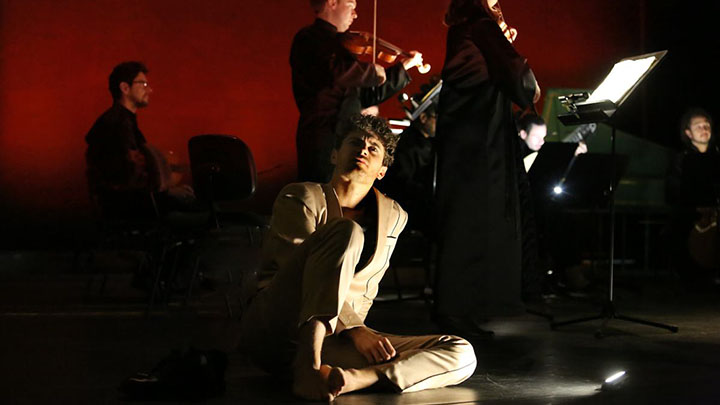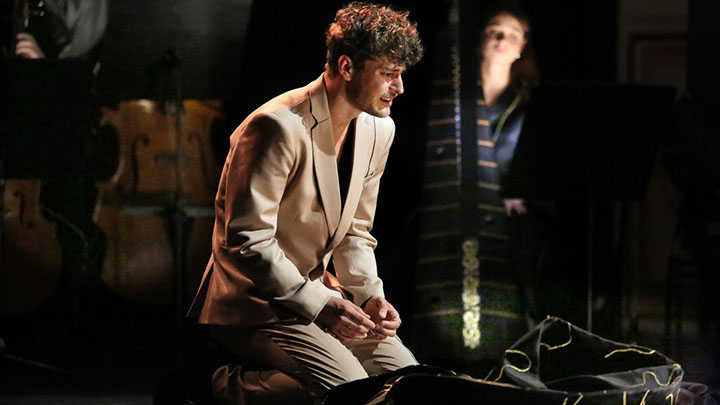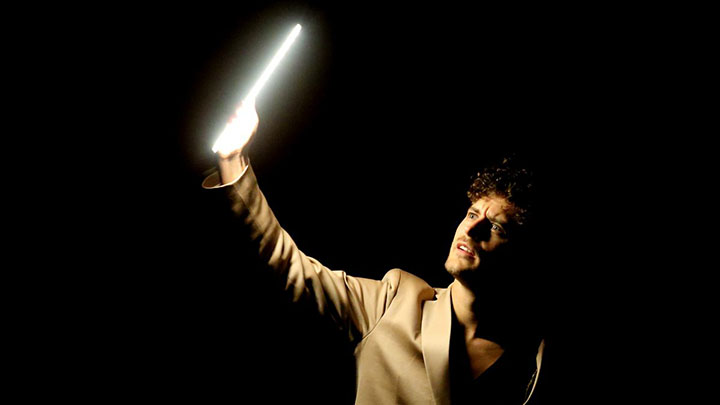
Personally, I find there to be no better way to get to know an artist than attending his or her recitals in an intimate setting. Not only the audience gets a full display of the artist’s talents up close, but the audience also discovers the non-musical aspects of the artist, from the preparedness and inspiration, background stories, all the way to how the artist presents his or her art. In a way, it’s always harder for me to criticize a recital because it’s oh so personal, tailored specifically by and/or for the artist.
I, however, had no such problems reviewing the extraordinary Polish countertenor Jakub Józef Orlinski’s recital with the esteemed Baroque period-instrument ensemble Il Pomo d’Oro on lase weekend at Bing Concert Hall in Stanford. Dubbed Beyond, the concert was the third of the 6-cities 2024 North America Tour with Il Pomo d’Oro in support of his October 2023-released album of the same name. Bay Area was lucky to receive two legs of this amazing concert, as it was also presented at Zellerbach Hall in Berkeley five days prior (with a seminar and concert at SF Conservatory of Music in between).
Writing in the program notes for Cal Performances, Orlinski mentioned that:
“Beyond features music by Monteverdi, Caccini, Frescobaldi, Cavalli, Netti, Sartorio, Moratelli, and other early Baroque composers. In it, I delve into the meaning of the word “beyond,” particularly in the sense that this music resonates beyond its own time. It is still relevant, still alive, vibrant, touching, engaging, and entertaining.
Together with Il Pomo d’Oro and its acclaimed musicians, I’m taking you on a journey of discovery “beyond” the limits of a classical concert or musical concept. I’m helped in my endeavour by my dear friend Yannis François, whose period research dug up some extraordinary pieces, many of which—like some on my previous solo albums—became world premiere recordings.”
Furthermore, in the Beyond CD booklet (that Stanford Live included as part of its digital program), Yannis Françoiswrote the following:
“The idea of developing a programme for Jakub’s voice based around the Seicento (the 17th century in music) had been gestating in my mind for quite some time, given the particular expressiveness of his musicality in this repertoire. So vast are the possibilities afforded by this era that compiling the album, making the right choices, felt a daunting task: from operas to cantatas, serenades to canzoni for solo voice, the prospects seemed endless. I chose then not to choose, taking instead just one example from each of these forms, thus offering the listener an aural glimpse of the riches of this century.
Each programme I’ve constructed for Jakub has featured a core composer, a guiding light whose music inspires me through the development of the recital or brings that missing atmosphere to its overall balance. […] Here, for Beyond, our most represented figure is Giovanni Cesare Netti (1649–1686). It was only by chance that I discovered his manuscripts in the course of my research, and I was struck by the beauty of his compositions. The variety that inhabits his scenes is unbelievable; a single scene may feature a character producing recitatives and arias of totally different textures and colours. This is certainly the case here in Berillo’s scene from Netti’s opera La Filli (La moglie del fratello) (1682).”
The Sunday recital, 75-minutes long without intermission, essentially mirrored the programming for the CD above, as it showcased most of the arias and smaller number of instrumental pieces from the set in the same order, except for Biagio Marini’s instrumental “Passacalio” from Per ogni sorte di strumento musicale, Op. 22, No. 25.
I had the opportunity to review Orlinski a few times on these pages a few times before – from his title role debut in George Frideric Handel’s Tolomeo at 2020 Karlsruhe Handel Festival to the spellbinding turn as Orpheus in San Francisco Opera’s production two years ago – and he seemed to have gone from strength to strength each time I encountered him. True to his words, Beyond expanded the limits of a classical recital as it explored all Orlinski’s considerable talents and wrapped them in a single coherent presentation that I hadn’t been expecting when I stepped into the auditorium.
The show was basically a staged recital, complete with costumes and lighting (pity there wasn’t any lighting designer/coordinator mentioned, because it wasa pretty significant effort). It started in complete darkness, then the members of il Pomo d’Oro dressed in all black one by one entered the stage to stand behind their respective instruments, almost cult-like. Orlinski entered last, donning a long black rope adorned with gold trimmings (he wore a cream-colored suit with black undershirt underneath), and the stage was lighted up. From there the performance was launched into without a break or even a single spoken word (naturally, no score or stand for Orlinski in sight, either)!
Just the like CD, the show began with Ottone’s entrance aria “E pur io torno qui” – “one of the Seicento’s most famous scores for alto voice” according to the program – from Act 1 of Claudio Monteverdi’s last opera L’incoronazione di Poppea. The aria, with its ever-changing moods (from amorous to anger to resignation), was a perfect vehicle to give the audience a taste of things to come. Aided handsomely by the 10 members of il Pomo d’Oro, right from the start, Orlinski fully embodied the lovelorn Ottone with his voice and his mannerisms, his voice sounded warm and round. Even more noticeable than before was his dynamic phrasing and the colorful nuances of his voice, important aspects for dramatic aria like this. Canzone “Voglio di vita uscir” was appended to this scene to round off the journey of emotions, the feeling of despair and death.
The first instrumental portion came from the aforementioned Marini’s “Passacalio” played beautifully by il Pomo d’Oro. In this concert, il Pomo d’Oro weren’t only an accompanying ensemble, but importantly, they also provided a much-needed structure for the performance and contributed significantly to its success. It was truly exhilarating to see the camaraderie of each member of the group; with winks and smiles they acknowledged and supported each other and they found joy in performing the pieces, no matter how many times they performed together. During the piece (and most of the other instrumental pieces) Orlinski retreated to the back, allowing il Pomo d’Oro to get full spotlight treatment.
Two other lost-love arias followed, Giulio Caccini’s “Amarilli, mia bella” from Le nuove musiche (1602) and Girolamo Frescobaldi’s “Così mi disprezzate” from Arie musicali, Book I (1630) – the latter nicely demonstrated Orlinski’s considerable coloratura skill and breath control – before il Pomo d’Oro began a piece by Frescobaldi’s student, Johann Caspar Kerll’s Sonata for Two Violins in F major, which highlighted Alfia Bakieva and Jonathan Ponet’s expertise.
Orlinski pulled different tricks for the next few pieces. For L’amante consolato from Barbara Strozzi – the first professionally recognized female composer, according to the program – he took a portable LED light with him, walked up and down to the Terrace levels of Bing Concert Hall, and sang there, giving the recital an immersive feel. He then slipped back into the black robe and in dignified manner portrayed Pompeo as he attacked Francesco Cavalli’s “Incomprensibil nume” from his 1666 opera, Pompeo Magno. The breakdancing Orlinski made an appearance during the lengthy Sinfonia from Carlo Pallavicino’s first opera, Demetrio.
The show reached its apex with the first appearance of Beyond’s core composer, Giovanni Cesare Netti, the aforementioned Berillo’s scene from Act 2 of Netti’s second opera La Filli. Similar to Ottone’s entrance aria in the beginning, this mesmerizing scene was marked with a full range of emotions, from anger to acceptance. Here Orlinski trimmed down the antics and earnestly performed the scene with searing intensity both in his voice and his acting, drawing the audience deep into his interpretation. After such an emotional draining moment, guitarist Miguel Rincon began the next piece, Antonio Sartorio’s “La certezza di tua fede” from his 1677 opera Antonino e Pompeiano, with a guitar solo to lighten up the mood, before the whole ensemble and Orlinski joined in to sing about the constancy of love.
Once again, the concert took a different path for the final three songs, starting with Orlinski exploring his comedic timing as the cross-dressing nursemaid Crinalba in Netti’s 1681 opera L’Adamiro. With the black robe wrapped around his waist as his skirt and a black head veil, he contorted his body to resemble a frail old woman, even demanding one of the instrumentalists to bring him a chair! Vocally, he sang the first of Crinalba’s aria “Quanto più la donna invecchia” in an exaggerated accent and broken phrasings, which drew big laughs from the audience. “Son vecchia, patienza,” on the other hand, was done with elevated weariness and resignation. After a brief instrumental piece from 17th Century Polish composer Adam Jarz?bski (his Tamburetta from Canzoni e concerti), the recital was concluded with Sebastiano Moratelli’s “Lungi dai nostri cor” from his serenata La Faretra smarrita, done in a solemn meditative way, before Orlinski turned off the portable light and left the stage in complete darkness.
On that day, the audience truly appreciated Orlinski and il Pomo d’Oro’s efforts and showered the artists with thunderous and extended applause. He seemed to be very moved by the reception, so much so that he presented three encores, all of which came from his 2019 album Facce d’amore, also with il Pomo d’Oro. The first was “Chi scherza con Amor” from Giovanni Antonio Boretti’s opera Eliogabalo, followed by his calling card, “Lucidissima face” from Francesco Cavalli’s La Calisto, where he challenged the audience to mimic his coloratura with growing difficulties. The final, and lengthiest, was “Che m’ami ti prega” from Giuseppe Maria Orlandini and Johann Mattheson’s Nerone, during which he inserted a couple “breaks” to show off his vocal ranges to the audience’s delight.
This recital was truly a remarkable achievement for both Orlinski and the members of il Pomo d’Oro, a collaborative effort that was marked by high levels of showmanship, respect, and dedication to the lost art. It was truly one of a kind! I really wish I could have experienced it once again! There are only 2 shows left in the series, April 20th in Peace Center, Greenville, SC and April 21st at the University of Georgia, Athens, GA. Trust me, you’ll be sorry to miss this spectacle!
Photos: Marek Grotowski (from Wroclaw)




























Comments